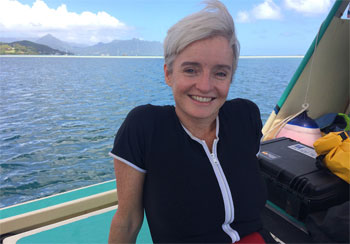Catalyst

Can We Save the Reef?
In next week's Catalyst (screening Tuesday 3 October, 8.30pm on ABC & ABC iview) join Professor Emma Johnston as she asks the question Can We Save the Reef?
Off Australia's northeast coast lies a wonder of the world; a living structure so big it can be seen from space. It's more intricate and complex than any city, and so diverse it hosts a third of all fish species' in Australia.
This is the Great Barrier Reef; 2,600km of coral reefs, lagoons, islands, and deep channels - a living fortress that meets the relentless power of the sea head-on, and protects Australia's coast. A name recognised by most, but understood by only a handful of intrepid people. The Great Barrier Reef as we know it - 8,000 years old and home to over 2,000 marine species – is dying in our lifetime.
Can We Save the Reef? is the epic story of Australian and international scientists who are racing to understand our greatest natural wonder, and employing bold new science in an attempt to save it. Professor Emma Johnston is a passionate diver, leading marine biologist, and board member of the Great Barrier Reef Marine Park Authority. It's part of her mission as a scientist, and an Australian, to protect our Reef. Both hard-hitting and hopeful, Professor Johnston shows us how no two are the same and how other reef systems, like the one in Hawaii, are proving to be valuable testing grounds for what can be done at home in Australian waters to help ours survive.
Working with Australian scientist Dr Madeleine van Oppen, Dr Ruth Gates in Hawaii is identifying and testing coral species with the greatest resilience. Part of their joint work is to breed coral under warmer, more acidic, future-ocean conditions. Here in Australia, at the Australian Institute of Marine Science (AIMS), Dr Madeleine van Oppen is pioneering ways to breed hardier Great Barrier Reef corals and, to breed more resilient algae (their symbionts and food source) to co-exist with and keep more coral alive.
Host Professor Johnston explores when and how science should intervene to put hardy new coral species on the Reef, and whether the pitfalls of new genetics could do more harm than good. But this is not a story about coral alone. To understand how to save a reef, one must understand the Great Barrier Reef itself. How and why did it form and thrive? What actually is the Great Barrier Reef? What other threats are affecting it, and how do we best safeguard it? Professor Johnston reveals a phenomenally complex ecosystem, and how the solutions to save ours, may also help save reefs worldwide.
Professor Emma Johnston is an award-winning marine ecologist and Dean of Science at UNSW Sydney. She is a leading authority in marine ecology and a former Pro Vice-Chancellor (Research) at UNSW. Emma has previously appeared on a science special of Q&A and ABC's One Plus One.
MORE



